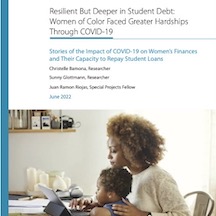 A new report from the Center for Responsible Lending examines how the COVID-19 pandemic impacted the already significant student debt crisis for Black women.
A new report from the Center for Responsible Lending examines how the COVID-19 pandemic impacted the already significant student debt crisis for Black women.
Women are holders of about two-thirds of the $1.7 trillion federal student debt. Black women are twice as likely to owe more than $50,000 in undergraduate student debt compared to White men. The report notes that “while a typical White male borrower pays off almost half of his balance within 12 years of starting college, the balance of a typical Black female borrower grows by 13 percent.”
The COVID-19 crisis has exacerbated the financially unstable positions of many women, furthering gender disparities. The Center for Responsible Lending commissioned four focus groups with women who voluntarily or involuntarily left the workforce during the pandemic and conducted descriptive analysis on publicly available datasets. The research sought to analyze how women’s finances have changed over the course of the past two years and what implications these changes have had on women’s long-term financial well-being and their ability to repay outstanding education debt.
Overall, the findings indicate the widespread disruption in employment due to the pandemic has had a profound impact on women, their families, and their finances. Despite demonstrating immense resiliency, the worst outcomes have disproportionately harmed women of color.
Among the finding are:
- Due to increased childcare responsibilities, as well as the high-contact, low-wage nature of many women’s occupations, women of color and women in jobs who could not go remote have less job security today than pre-pandemic.
- The economic gains made through 2021 were not shared equally across racial groups. Women of color continue to experience financial hardship paying for necessities.
- Student loan debt burdens remain at staggering levels, despite the payment pause. Black women borrowers typically have higher student loan balances than White women, making repayment more difficult.
The full report, Resilient But Deeper in Student Debt: Women of Color Faced Greater Hardships Through COVID-19, may be downloaded here.










